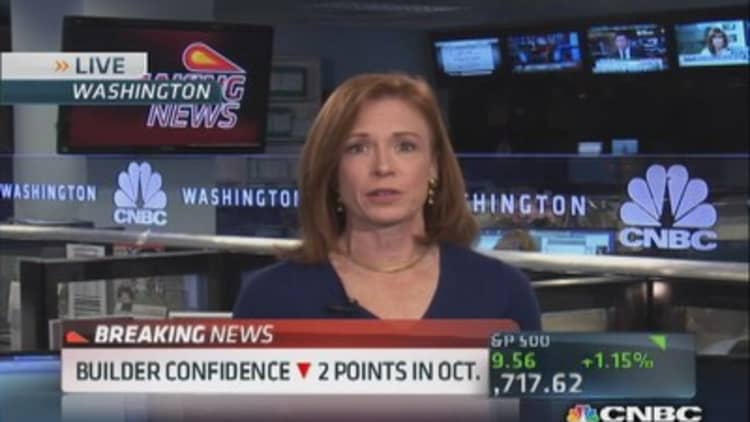In major cities across America, commercial real estate is seeing a rebirth. After crashing hard during the recent recession, sales and development are soaring again, and financing is finally following through.
"There is a lot of momentum in commercial real estate," said Sam Chandan of Chandan Economics. "The banks are re-engaged. In the second quarter of this year, we saw a net increase in lending on construction projects for the first time since the financial crisis."
Commercial property sales volume is on track to surpass $300 billion this year. That is an increase of 380 percent from the low in 2009, according to Chandan. Sales spiked in the final quarter of 2012 on speculation of higher tax rates. Imagine what would happen in the reverse if a debt default caused a spike in interest rates.
"Commercial real estate is very interest rate sensitive and credit dependent and long term. Those are not good formulas if you have a high interest rate environment or an environment in which credit is volatile," said Stephen Renna president of the Commercial Real Estate Finance Council.
(Read more: Shutdown costs rural family $10,000)

It is also a highly leveraged business, depending on big banks and investors in commercial mortgage-backed securities. CMBS was in deep trouble just five years ago, as property values fell, but defaults are now way down.
In 2008 the CMBS market was negligible, down from $230 billion in 2007, according to Renna. Last year it came back to around $45 billion and is on pace to reach about $75 billion for 2013. If a debt default pushes interest rates higher, all bets are off.
"About 50 percent of all commercial real estate lending is bank driven, so if banks have less capital, and are losing capital, they are in a position where they are going to be preserving their capital instead of putting their capital out there in the form of a commercial real estate loan," added Renna.
At Maryland-based Walker & Dunlop, a commercial real estate finance company, the view is positive for the long term, but uncertainty in nearby Washington, D.C., is weighing on both borrowers and investors.
"The most discouraging thing that we are seeing right now is that this Congress is going to go through yet another crisis and probably end up kicking the can down the road, but not even as far as many people would like to see it get kicked," said Willy Walker, chairman and CEO of Walker & Dunlop.
(Read more: Government 'paralysis' spooks home builders )
Walker's clients, large owners of commercial real estate properties, are typically borrowing money for 10-year terms. Their cost of financing has a huge impact on their projects. While they haven't been impacted yet, more delays could still hurt.
"If they end up kicking it down the road for three months, we're right back into the brinksmanship, so it would be really nice to see them kick the can for a year to give us all time to breathe for a moment, rather than this consistent kind of crisis-to-crisis environment," says Walker.
(Read more: Shutdown's 'notable impact' on mortgages)
—By CNBC's Diana Olick. Follow her on Twitter @Diana_Olick.
Questions? Comments? facebook.com/DianaOlickCNBC


